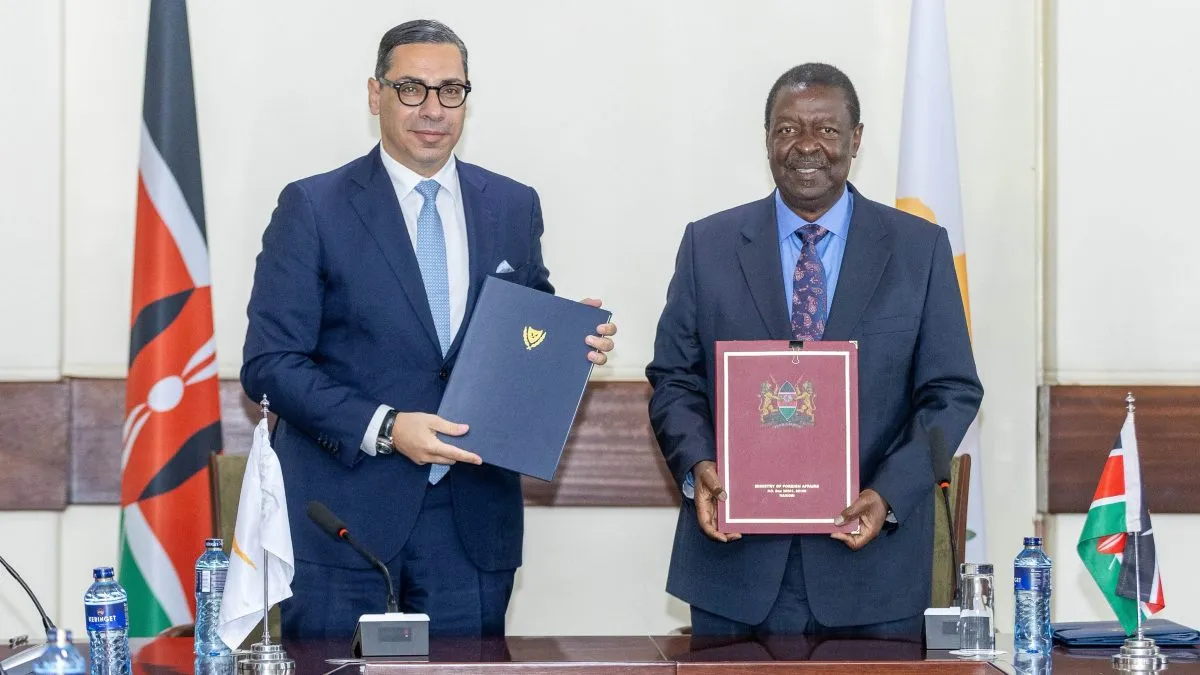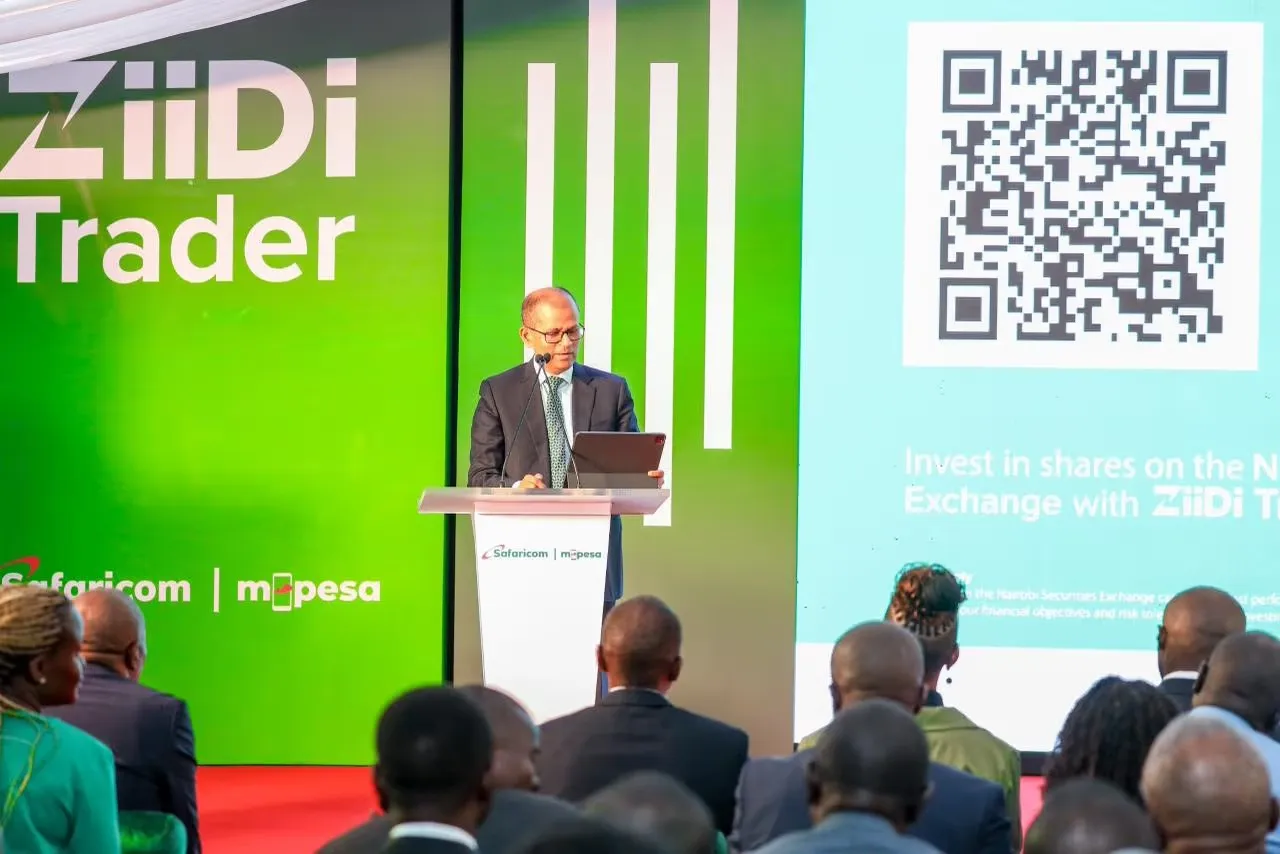In a significant diplomatic stride, the Republic of Cyprus has officially inaugurated its embassy in Nairobi, marking a pivotal moment in its burgeoning relationship with Kenya. The ceremonial opening, attended by Kenya’s Prime Cabinet Secretary and Cabinet Secretary for Foreign and Diaspora Affairs, Musalia Mudavadi, and his Cypriot counterpart, Minister for Foreign Affairs Constantinos Kombos, coincided with the signing of a crucial Memorandum of Understanding (MOU) on political and diplomatic consultations. This dual event unequivocally reaffirms both nations’ commitment to strengthening bilateral relations and unlocking new avenues for cooperation.
Prime Cabinet Secretary Mudavadi emphasized that the establishment of the new embassy lays a “firm foundation for deeper dialogue, expanded cooperation, and richer engagement.” This gesture, he noted, “underscores our collective resolve to unlock new opportunities for economic growth, tackle shared challenges, and foster meaningful people-to-people connections, building on the political cooperation agreement framework we signed earlier today.” The mutual recognition by both ministers of the vast, untapped potential within Kenya-Cyprus bilateral relations signals a proactive approach to exploring tangible outcomes that will benefit the citizens of both countries.
Deepening Diplomatic Roots: The Significance of an Embassy
The opening of an embassy is far more than a symbolic gesture; it represents a profound commitment to long-term bilateral engagement. For Cyprus, a European Union member state, establishing a permanent diplomatic presence in Nairobi signifies a strategic pivot towards strengthening its ties with key African nations. This move aligns with Cyprus’s broader foreign policy objectives, which increasingly recognize the growing economic and geopolitical importance of the African continent. Cyprus has been actively seeking to expand its diplomatic footprint and economic partnerships in Africa, as evidenced by recent visits by its Foreign Minister to countries like Tanzania for EU partnership talks (The Citizen on Cyprus FM visit to Tanzania).
For Kenya, hosting a new embassy from an EU member state like Cyprus reinforces Nairobi’s burgeoning status as a diplomatic and economic hub in Sub-Saharan Africa. It enhances Kenya’s international visibility and provides a direct channel for sustained dialogue and cooperation. Embassies facilitate:
- Direct Communication: They serve as primary points of contact for governments, enabling swift and efficient communication on bilateral and multilateral issues.
- Consular Services: They provide essential services to citizens, including visa processing, passport renewals, and assistance to nationals abroad.
- Cultural Exchange: Embassies often host cultural events, promoting understanding and fostering people-to-people connections.
- Economic Facilitation: They play a crucial role in promoting trade, investment, and business partnerships by connecting enterprises and providing market intelligence.
- Political Representation: They allow for continuous engagement on political matters, including regional stability, human rights, and global governance.
The newly signed Memorandum of Understanding (MOU) on political and diplomatic consultations formalizes a framework for regular high-level discussions between the two foreign ministries. This ensures that dialogue is structured and frequent, allowing both nations to align on shared interests and coordinate responses to global and regional challenges.
Unlocking Economic Opportunities: A Shared Vision for Growth
The discussions between Minister Mudavadi and Minister Kombos delved extensively into various sectors ripe for enhanced economic cooperation, highlighting a mutual desire to translate diplomatic goodwill into tangible economic benefits.
1. Agriculture and Exports to Europe:
Agriculture is the backbone of Kenya’s economy, contributing significantly to its GDP and employment. Kenya is a major exporter of horticultural produce, including sweet peas, runner beans, Asian vegetables, avocados, and high-quality green beans. The EU is Kenya’s principal market for these exports, with the UK, Netherlands, and France being key destinations (InfoTrade Kenya on agricultural exports).
The ministers pledged to strengthen collaboration in agriculture with the specific aim of boosting Kenya’s exports to Europe. This could involve:
- Technical Assistance: Cyprus, with its advanced agricultural practices and EU market access experience, could provide expertise in improving farming techniques, post-harvest handling, and compliance with stringent EU sanitary and phytosanitary standards.
- Value Addition: Support for processing and value addition of Kenyan agricultural products before export, which would increase earnings and create more local jobs.
- Market Linkages: Facilitating direct connections between Kenyan producers and Cypriot/European buyers, potentially reducing intermediaries and increasing profitability for Kenyan farmers.
2. Education, Scholarships, and Capacity Building:
Kenya places a high premium on education and human capital development. The agreement to expand collaboration in scholarships and capacity-building programs for Kenyans is a significant win. This could involve:
- University Partnerships: Establishing exchange programs between Kenyan and Cypriot universities, fostering academic collaboration and research.
- Vocational Training: Developing specialized vocational training programs in sectors where Cyprus has expertise (e.g., maritime, tourism, financial services) to improve the employability of Kenyan youth and address specific skill gaps.
- Scholarships: Providing opportunities for Kenyan students to pursue higher education in Cyprus, gaining international exposure and specialized knowledge. Organizations like the International Scholars Program facilitate such opportunities for Kenyan students.
This collaboration directly addresses Kenya’s need for a highly skilled workforce, crucial for its economic transformation and competitiveness in a globalized world.
3. Maritime, Blue Economy, and Shipping:
Given both Kenya’s extensive coastline and Cyprus’s status as a global shipping powerhouse, deepening cooperation in the Maritime, Blue Economy, and Shipping sectors holds immense potential.
- Blue Economy: Kenya has identified the “Blue Economy” – the sustainable use of ocean resources for economic growth, improved livelihoods, and jobs – as a key development frontier. Its maritime resources include fisheries, aquaculture, mangroves, marine minerals, and renewable ocean energy. The Kenyan government has established a State Department for Fisheries, Aquaculture, and the Blue Economy to coordinate policy and legal frameworks (NEMA on Blue Economy). Cyprus’s expertise in sustainable marine resource management, offshore energy, and maritime governance could be invaluable.
- Shipping and Logistics: Cyprus boasts one of Europe’s most developed maritime industries, with a large flag registry and over 1,000 registered shipping companies. Its strategic location at the crossroads of Europe, Asia, and Africa, coupled with favorable tax incentives, has made it a global hub (Soneverse on Cyprus Economy). Collaboration could involve:
- Port Development: Sharing expertise in port management, logistics, and infrastructure development.
- Maritime Training: Offering training programs for Kenyan seafarers and maritime professionals, enhancing their skills and opening up global employment opportunities.
- Ship Registration and Services: Exploring opportunities for Kenyan vessels to register under the Cypriot flag or for Cypriot companies to invest in Kenyan maritime services.
4. Tourism Sector Promotion:
Both leaders underscored the importance of promoting the tourism sector. Kenya’s tourism industry experienced a substantial rebound in 2024, with international arrivals exceeding 2.4 million and earnings projected at Kshs. 452.20 billion (approximately $3.48 billion USD), marking a 19.79% increase. This impressive recovery, highlighted by CNBC Africa, positions Kenya as an attractive destination. Cyprus, with its well-established tourism industry (contributing around 15% of its GDP), can offer insights into sustainable tourism practices, marketing strategies, and diversification of tourism products. Collaboration could involve joint marketing campaigns, sharing best practices in hospitality, and facilitating direct flights.
5. Labor Mobility Framework:
A particularly impactful discussion revolved around the prospect of a “comprehensive framework on labour mobility to streamline access to employment opportunities for the youth in Kenya and Cyprus.” This is a critical area for Kenya, given its large youth population and the challenge of unemployment. Such a framework could:
- Legal Pathways: Establish legal and regulated pathways for Kenyan youth to seek employment in Cyprus, particularly in sectors facing labor shortages (e.g., tourism, hospitality, healthcare, construction).
- Skills Matching: Facilitate skills assessment and training programs to ensure Kenyan workers meet Cypriot labor market demands.
- Worker Protection: Include provisions for the protection of workers’ rights, fair wages, and safe working conditions, preventing exploitation.
Kenya has already signed similar labor mobility agreements with other countries, such as Germany, demonstrating its commitment to creating opportunities for its diaspora.
Kenya’s Regional and Global Stature: A Hub for Engagement
Minister Kombos lauded Kenya’s “conducive and welcoming environment for diplomacy,” noting that Nairobi continues to cement its place as a leading regional hub for international engagement and business. This recognition is well-deserved, as Kenya’s strategic position and active participation in regional and continental blocs make it an attractive partner for international players like Cyprus.
Kenya as a Financial Hub:
Kenya is widely recognized as a key financial hub in Sub-Saharan Africa. Nairobi hosts the regional headquarters of numerous multinational companies, international organizations, and financial institutions. This robust financial ecosystem, coupled with a dynamic private sector, solidifies its position as a strong global investment destination. The recent decision by the World Bank and the International Finance Corporation to base some of their regional vice presidents for Eastern and Southern Africa in Nairobi further boosts the city’s standing (The Star on Nairobi as UN hub).
Membership in Key Regional Blocs:
Kenya’s active membership in several regional economic communities (RECs) and continental initiatives significantly enhances its appeal:
- East African Community (EAC): A regional intergovernmental organization of seven partner states (Burundi, Democratic Republic of Congo, Kenya, Rwanda, South Sudan, Tanzania, and Uganda) that aims to widen and deepen economic, political, social, and cultural integration.
- Common Market for Eastern and Southern Africa (COMESA): A free trade area with 21 member states, designed to promote regional integration through trade and investment.
- African Continental Free Trade Area (AfCFTA): The largest free trade area in the world by the number of participating countries, aiming to create a single continental market for goods and services, with free movement of business persons and investments. Kenya’s active participation in AfCFTA is expected to boost intra-African trade by over 40% within a decade, leading to significant job creation and poverty reduction (Mashariki Research and Policy Centre on AfCFTA).
These memberships provide Cyprus with a gateway not just to Kenya’s market but to a much broader African consumer base and investment landscape. The Cypriot side explicitly expressed interest in providing relevant expertise and engaging in partnerships with a wide variety of countries across the African continent, leveraging Kenya as a strategic entry point.
EU Economic Partnership Agreement and Multilateralism
A significant aspect of the discussions was Cyprus’s assurance of support for Kenya in the implementation of the Economic Partnership Agreement (EPA) with the European Union. This commitment gains particular weight as Cyprus prepares to assume the rotational Presidency of the European Union Council in 2026.
The EU-Kenya EPA:
The EPA, signed on December 18, 2023, and entering into force in July 2024, provides Kenya with duty-free, quota-free access to the EU market for all its exports (except arms). In return, Kenya will gradually and partially open its market to imports from the EU over 25 years, with protections for economically important goods. This agreement is crucial for Kenya as the EU is its largest export destination, supporting over 500,000 jobs in Kenya (European Commission on Kenya-EU Partnership). The EPA is expected to bolster trade, industrial expansion, and overall economic growth, particularly for Kenya’s agricultural sector. It also includes enforceable commitments to sustainable development, emphasizing labor, gender equality, climate, and the environment (TripleOKLaw on EU-Kenya EPA).
Cyprus’s Role as EU President:
When Cyprus assumes the EU Council Presidency in January 2026, it will have a unique opportunity to shape the EU’s agenda and influence its external relations. Its commitment to supporting Kenya’s EPA implementation during this period is highly beneficial. This could involve:
- Advocacy: Advocating for Kenya’s interests within the EU, ensuring smooth implementation and addressing any potential challenges.
- Facilitation: Facilitating technical assistance and capacity-building programs from the EU to help Kenya maximize the benefits of the EPA.
- Broader Africa-EU Relations: Using its presidency to strengthen the overall relationship between the EU and African nations, potentially fostering more equitable and mutually beneficial partnerships.
- Regional Stability: Cyprus’s presidency priorities are expected to include strengthening EU engagement in the wider Middle East and potentially Africa, focusing on conflict resolution, maritime security, and humanitarian operations (Azure Strategy on Cyprus EU Presidency).
Commitment to Multilateralism:
Both leaders underscored the need to “entrench a sense of shared interest and a joint commitment to multilateralism and rules-based international order.” This reflects a common understanding that global challenges – from climate change and pandemics to economic instability and security threats – require collective action. Kenya has a long-standing foreign policy based on principles of peaceful co-existence, non-alignment, and adherence to UN Charters, with a focus on economic, peace, environmental, cultural, and diaspora diplomacy (Kenya Embassy Brazil on Kenya Foreign Policy).
As smaller nations, both Kenya and Cyprus benefit immensely from a rules-based international order that protects sovereignty and promotes fair trade. Their agreement to broaden their shared perspective on how they can work together more effectively on the global stage could lead to coordinated efforts in international forums, advocating for common positions on issues of mutual concern.
Fast-Tracking Agreements: Paving the Way for Concrete Outcomes
The commitment to fast-track pending Memorandums of Understanding (MOUs) and commence work on new bilateral agreements signals a strong intent to move beyond diplomatic rhetoric to concrete, actionable outcomes.
Pending MOUs:
- Higher Education and Research: This MOU will formalize and expand the collaboration in education, potentially leading to more structured exchange programs, joint research initiatives, and mutual recognition of academic qualifications.
- Agriculture and Livestock Development: This will provide a detailed framework for cooperation in the agricultural sector, outlining specific areas of collaboration, technical assistance, and potential investment opportunities.
- Bilateral Air Services Agreement (BASA): A BASA is a treaty between two countries that allows international commercial air transport services between their territories. It typically covers aspects like the number of flights, designated airlines, and served airports. A BASA between Kenya and Cyprus would facilitate direct flights, boosting tourism, trade, and people-to-people connections, and is crucial for establishing and managing international air routes (GlobeAir on BASA).
- Bilateral Agreement on the Avoidance of Double Taxation (DTA): This is a critical agreement for businesses and individuals engaged in cross-border economic activities. A DTA ensures that income earned in one country by a resident of the other is taxed in only one of the two countries, preventing the same income from being taxed twice. It also includes provisions to prevent tax evasion and facilitate information exchange between tax authorities (DBS Bank on DTAA benefits). This agreement would significantly boost trade and investment flows by providing tax certainty and reducing the tax burden for businesses operating in both Kenya and Cyprus.
The new Cyprus embassy, located on the 11th floor of the Piano Building, 171 Brookside Drive in Westlands, Nairobi, will serve as the operational hub for these burgeoning diplomatic and economic initiatives, symbolizing the tangible commitment of Cyprus to its relationship with Kenya.
Featured ESG Tool of the Week:
Klimado – Navigating climate complexity just got easier. Klimado offers a user-friendly platform for tracking local and global environmental shifts, making it an essential tool for climate-aware individuals and organizations. In an era where climate data can be overwhelming, Klimado provides clarity and actionable insights, empowering users to make informed decisions for a more sustainable future.
Conclusion
The inauguration of the Cypriot embassy in Nairobi and the signing of key agreements mark a new chapter in the relations between Cyprus and Kenya. This deepening engagement is a testament to Kenya’s growing stature as a regional economic and diplomatic powerhouse and Cyprus’s strategic interest in expanding its footprint in Africa. From boosting agricultural exports to Europe and fostering educational opportunities to collaborating on maritime affairs and streamlining labor mobility, the potential for mutually beneficial outcomes is vast. As both nations commit to fast-tracking pending agreements and championing multilateralism on the global stage, this enhanced partnership is poised to deliver concrete results, strengthening economic ties, fostering cultural exchange, and contributing to shared prosperity in an increasingly interconnected world.
Photo source: Google
By: Montel Kamau
Serrari Financial Analyst
8th July, 2025
Article, Financial and News Disclaimer
The Value of a Financial Advisor
While this article offers valuable insights, it is essential to recognize that personal finance can be highly complex and unique to each individual. A financial advisor provides professional expertise and personalized guidance to help you make well-informed decisions tailored to your specific circumstances and goals.
Beyond offering knowledge, a financial advisor serves as a trusted partner to help you stay disciplined, avoid common pitfalls, and remain focused on your long-term objectives. Their perspective and experience can complement your own efforts, enhancing your financial well-being and ensuring a more confident approach to managing your finances.
Disclaimer: This article is for informational purposes only and does not constitute financial advice. Readers are encouraged to consult a licensed financial advisor to obtain guidance specific to their financial situation.
Article and News Disclaimer
The information provided on www.serrarigroup.com is for general informational purposes only. While we strive to keep the information up to date and accurate, we make no representations or warranties of any kind, express or implied, about the completeness, accuracy, reliability, suitability, or availability with respect to the website or the information, products, services, or related graphics contained on the website for any purpose. Any reliance you place on such information is therefore strictly at your own risk.
www.serrarigroup.com is not responsible for any errors or omissions, or for the results obtained from the use of this information. All information on the website is provided on an as-is basis, with no guarantee of completeness, accuracy, timeliness, or of the results obtained from the use of this information, and without warranty of any kind, express or implied, including but not limited to warranties of performance, merchantability, and fitness for a particular purpose.
In no event will www.serrarigroup.com be liable to you or anyone else for any decision made or action taken in reliance on the information provided on the website or for any consequential, special, or similar damages, even if advised of the possibility of such damages.
The articles, news, and information presented on www.serrarigroup.com reflect the opinions of the respective authors and contributors and do not necessarily represent the views of the website or its management. Any views or opinions expressed are solely those of the individual authors and do not represent the website's views or opinions as a whole.
The content on www.serrarigroup.com may include links to external websites, which are provided for convenience and informational purposes only. We have no control over the nature, content, and availability of those sites. The inclusion of any links does not necessarily imply a recommendation or endorsement of the views expressed within them.
Every effort is made to keep the website up and running smoothly. However, www.serrarigroup.com takes no responsibility for, and will not be liable for, the website being temporarily unavailable due to technical issues beyond our control.
Please note that laws, regulations, and information can change rapidly, and we advise you to conduct further research and seek professional advice when necessary.
By using www.serrarigroup.com, you agree to this disclaimer and its terms. If you do not agree with this disclaimer, please do not use the website.
www.serrarigroup.com, reserves the right to update, modify, or remove any part of this disclaimer without prior notice. It is your responsibility to review this disclaimer periodically for changes.
Serrari Group 2025
















